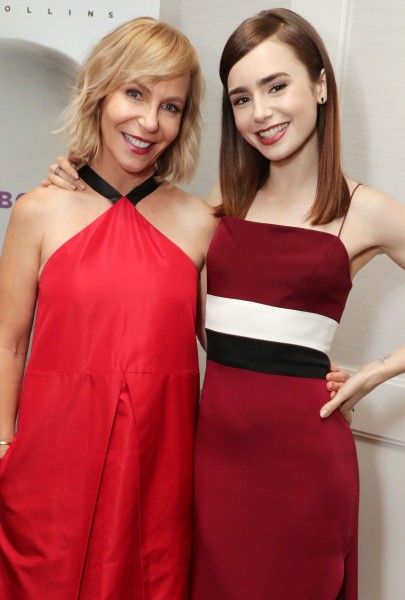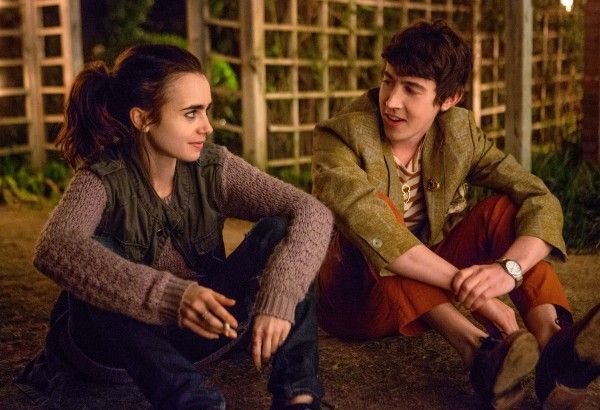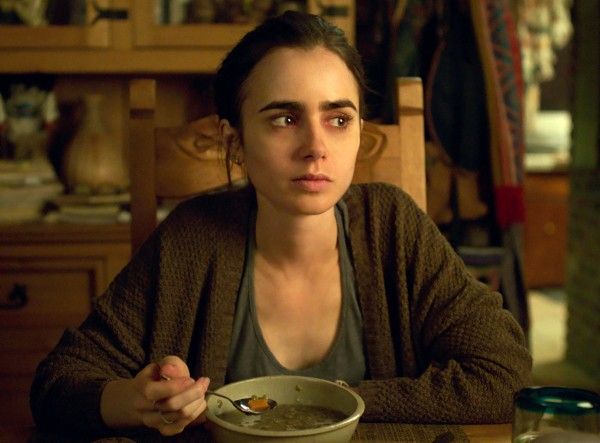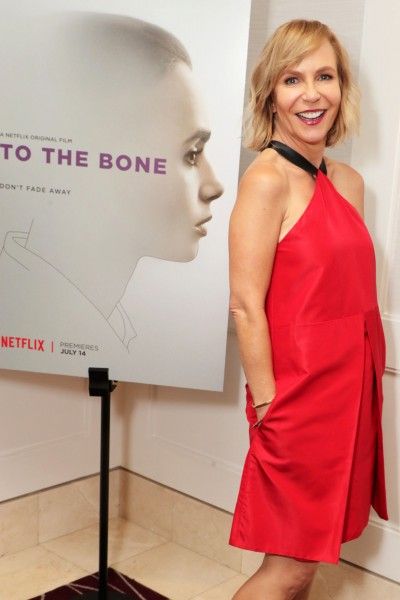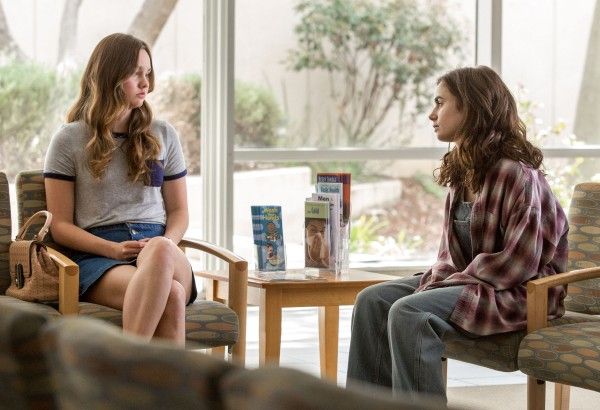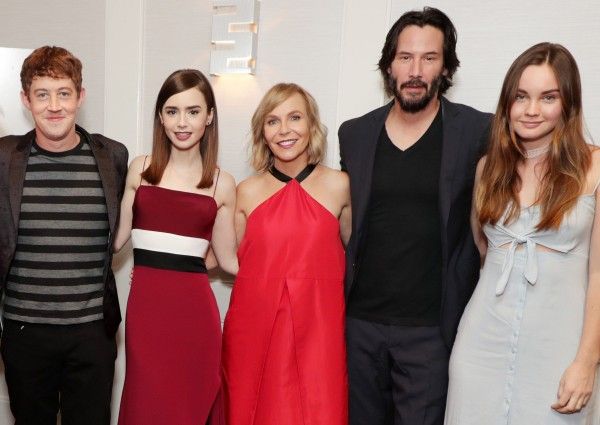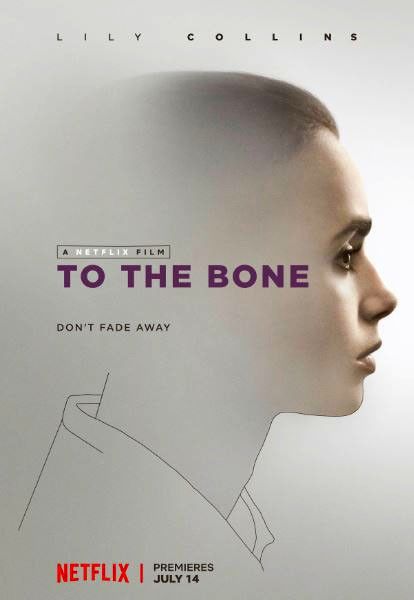Written and directed by Marti Noxon, the feature film To The Bone tells the story of Ellen (played magnificently by Lily Collins), a 20-year-old anorexic girl who has gone through a series of various recovery programs, only to continue down the path of her disease, every time. Determined to find a lasting solution, she agrees to go to a group home for youths, led by a non-traditional doctor (Keanu Reeves), where she must discover for herself how to confront her addiction in a way that leads to self-acceptance.
During this 1-on-1 phone interview with Collider, filmmaker Marti Noxon talked about telling such a personal story, why the writing process was so challenging, what made Lily Collins the right actress to bring this character to life, and why eating disorders have been such a taboo subject. She also talked about her next TV series, HBO’s Sharp Objects with Amy Adams, where things are at with the development of Dietland for AMC, making sure to never create defensively, what she’s learned from the showrunners she’s worked with in the past, and how she thinks Buffy the Vampire Slayer (on which she was a writer and producer) might be received if it premiered today.
Collider: This film explores a subject that’s deeply personal to you and that’s inspired by your own experience with life-threatening anorexia. How and when did you know that it was the right time and that this was the right way to tell this story?
MARTI NOXON: It’s interesting because, for years, I would tell anecdotes from this time and from things that I remembered, but the truth is that I didn’t remember a lot of it. I felt like it was this big blank spot. It’s this 10 year period in my life that I didn’t have a lot of access to. I was looking at another film that had a lot of childhood stuff in it, so I started thinking more about my own childhood, and then I started remembering more and more about when I had been sick. That started me thinking, “Maybe it’s time,” butt I’d never really been able to wrap my head around how to tell it. It really helped me to see and read The Fault in Our Stars. Ever since I worked on Buffy, it’s always helped me to find a genre container for something, and I was like, “Oh, this is where the movie melodrama has gone to. It’s gone to YA.” Even though I wanted to make something that had a little more teeth than a melodrama and had a little more humor, I could see how I could make it. That’s how I came to the Luke character, the group home and parts of my story that hadn’t actually happened. For a little while, I think because it was so personal, I was also wrapped up in my own story. I was able to go, “Oh, right, I can make stuff up. It doesn’t all have to be true.”
Did you find that the writing process and getting the story to where you wanted it to be more of a challenging than actually filming it, or was it more challenging to see all of this brought to life in front of you?
NOXON: You know, in general, the writing part, for me, is more challenging. This was probably the hardest thing I’ve had to write. Normally, I’m writing with a little bit more distance. It’s almost like the characters are talking to me and I’m taking dictation. With this, there were times when I’d have to take a helicopter view and try to see where I was tonally, and I’ve have to walk away from it, at times. The making of it, for the most part, was super joyful. I know it sounds strange, but it was exciting to be making something that we cared about, that was just for us. We didn’t have any expectation. We didn’t know who would see it. We had 23 days and there wasn’t a budget, so we were just doing it for the love of telling a story. There was really only one day when I was directing and crying, at the same time.
Why was Lily Collins the right person to play this character and help bring this story to life?
NOXON: It was interesting because I initially saw whoever was going to play her as somebody who’s parts in the past had at least had a little more snark, at least in terms of their persona, and Lily is so effervescent. But when I met her, we had an instant rapport. We understood each other really well. She had had her own experience and was in recovery, and that was a surprise, but it also helped enhance her understanding of it. And like me, she wanted to make the film as an extension of being in recovery, as a way to help other people and to start a conversation, in addition to just making a movie that we hoped would make people laugh and maybe cry. Being with Ellen through the whole film could be a bummer, if she didn’t have Lily’s light, and boy did she deliver. She dropped in, in a way that was so astounding. I felt like I was there to slightly guide her, but she was in it. It was remarkable.
Why do you think that, even though eating disorders have affected so many people, both male and female and of all different ages, it’s a subject that people still shy away from dealing with?
NOXON: I think there’s been a barrier to entry. There weren’t enough women making films who could tell these stories in a more authentic way until recently. There was a take on it that was not necessarily based on someone’s experience, but a book about it, and it was relegated to a woman’s issue, so it was a TV movie issue and not a film issue. We’ve finally reached that moment where enough people with the right resources said, “Yeah, make it a movie and treat it as you would any other life passage or difficulty.” It’s not a woman’s issue. It’s a human issue. Also, I just really wanted to communicate that it isn’t about vanity. I think there’s a misconception that it’s all about the body and all about looks, and that’s just the entry level issue. You drop into something much more universal, which is, why are you doing something to not be present in your life? What’s the pain that you’re running away from? That’s something that almost everybody can relate to, at one time or another.
You’re working on two TV shows, with Sharp Objects and Dietland, that come from source material. What’s the tipping point for you, as far as knowing that there’s enough there in a book to do a TV series, as opposed to doing a film?
NOXON: When I read Sharp Objects, in that case, it was less about whether you could make it work as a film. I knew it could work as a television show because it had so much rich character work, it had a mystery that you could build out, and characters that you could spend more time with in different places. It felt like there was a lot of material to mine. But I also just felt like the opportunity for success was going to be so much greater, and you could find a greater audience on television. Sometimes it isn’t whether the material could work exclusively one place or the other, it’s that the appetite for really complex female characters is so much greater, right now, in television. If you made a movie of Sharp Objects, chances are that it would be a smaller film, but as a TV show, it can reach a lot of people.
And you have incredible talent involved with Sharp Objects, including Amy Adams as your lead character. What do you think it is about that story and character that lured in someone that caliber?
NOXON: It’s funny, I’ve joked that Sharp Objects, To the Bone and Dietland are my self-harm trilogy, and each one is a different side of that triangle, with Dietland really about fighting back. I think she felt like she could get into a character whose response to her own anger and her own experience of violence was to hurt herself. That impulse to turn all of those ugly feelings inside and hurt yourself, as opposed to actually dealing with the thing was a really interesting character to start with. And Camille goes on a real journey. It’s a really appealing character for an actress.
How are things going with Dietland? Where are you at with that?
NOXON: We’ll know in a couple of weeks, if we get picked up. I’ve been joking that it’s kind of like getting pregnant with either a baby or a balloon. We’ve written six scripts, we have lots of talent on hold, we’ve pitched all kinds of visuals to the network, and we’re meeting with department heads. I hope they don’t pull the breaks. We’re ready to rock! I think there are a lot of people who would like to see a show like that. There’s nothing like it on TV.
You recently said that, in the last five or six years, it feels like you’ve really been hitting your stride. When did you realize that you were in a real sweet spot, and how does that feel?
NOXON: I feel like the law of averages says that the next thing I do has to really fail, so right now, I’m feeling a lot of pressure to choose wisely. You can’t ever create defensively. You just have to create the next thing that really speaks to you. The greatest part of it is that I’m such a fan of other creative people, and when you get to a place where you have momentum going, you get to meet some of these people and sometimes even work with some of them. To work with Amy Adams or Lili Taylor or Keanu Reeves, I’m so stoked about the people I get to meet. It feels a little unreal. It’s both intimidating and incredibly gratifying.
You’ve worked with some really talented, strong and fearless showrunners, like Joss Whedon and Matt Weiner, and now you’re a showrunner and director yourself, who everyone else is looking to for all of the answers. How did working with them shape you, and what’s it like to be the one in that position now?
NOXON: I’ve learned as much from the people who did things that I didn’t want to do, as I did from the people that did things I wanted to emulate, and some of them were the same people. I remember when I went to hear Cameron Crowe speak about writing, and he said that the greatest thing about being a writer is that you can remain anonymous, and you can continue to have this experience of walking in the world and just being another schmuck. In that way, I’ve always really treasured the fact that I’m part of this very small community and nobody gives a shit who I am. I am still a schmuck. I just want to keep writing and getting better at it, and writing deeply. To me, the most important lesson that I’ve learned, along the way, is to stay open to other people’s voices and to their criticism of my work. I don’t ever want to shut down because I feel like I’m too fancy. If you get to that place where you’re surrounded by people that just tell you what you want to hear, you’re in trouble. I try to keep perspective. It’s fake brain surgery, not real brain surgery.
Buffy the Vampire Slayer came at a time when we hadn’t seen a messed up heroine on TV. Now that we have seen quite a few female characters like that, how do you think the audiences of today would have reacted to that character, if she were debuting now?
NOXON: Oh, gosh, that’s funny! What’s interesting is that people still start watching the show now. So many people who watched it when they were younger are now introducing their kids to it, and their kids are still digging it. It has almost a fairy tale quality that feels out of time. Joss [Whedon] had the notion to make up our own slang and we wouldn’t use a lot of everyday slang, at the time, so it would have a timeless quality. I don’t know. I feel like she would probably be more controversial, in a way, because she’s such a chick. What I loved the most about her was that she was still a regular girl, but I wonder if people now would be like, “Why is she this, and not that?”
To the Bone is available to stream at Netflix on June 14th.


